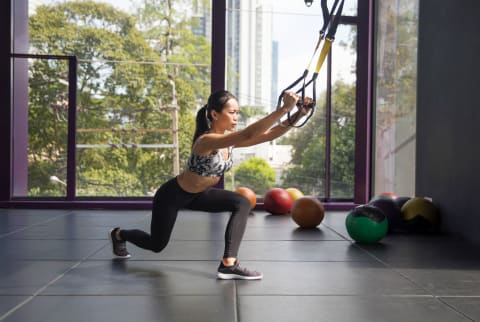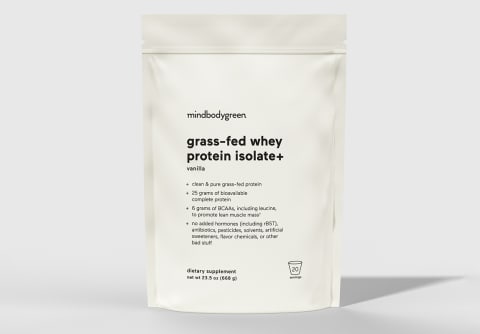Advertisement
How Much Protein You Should Eat Post-Workout + Best Protein Sources


Hungry post-exercise? Given the calories burned, this will come as no surprise, but what you eat after exercising can affect how your muscles respond to the workout. While there's no one post-workout meal that will work for everyone, there is one particular macronutrient we should all be sure to eat after breaking a sweat: protein.
On a recent episode of the mindbodygreen podcast, functional medicine doctor Gabrielle Lyon, D.O., gives her opinion on how much protein you need post-workout and where to get it. Here's her perspective.
How much protein should you eat after a workout?
"As you get older, the blood flow to the muscles increases post-training, and there's really good data1 to suggest that older muscle can respond like younger muscle post-training2 with the addition of dietary protein," Lyon says. Yes, you may be able to make your muscles act younger—which, in turn, may help you live longer—with the help of high-quality protein, according to Lyon.
Of course, not all protein is created equal. All protein sources are composed of different proportions of 20 amino acids. These protein building blocks all have their own role to play in repairing body tissue, and leucine is considered the most important for muscle protein synthesis3 (the creation of new muscle). For this reason, consuming 2.5-3 grams of leucine is recommended post-workout.
As for how much protein in total to aim for after a gym session, "Thirty grams of protein post-training is a great strategy for nearly everybody," Lyon says.
Regardless of whether or not you just worked out, eating around 30 grams of protein at a time is considered a good strategy for building muscle4. Eating within two hours of wrapping up your workout is considered an optimal refueling window to maximize muscle growth5. Learn more about protein timing here.
If you'd like to take a more personalized approach to your daily protein goals, Lyon also offers this simple calculator, and this article digs deeper into protein needs for women.
- For muscle maintenance: Take your weight in pounds and multiply by 0.8 to get optimal protein intake in grams
- To build muscle: Take your weight in pounds and multiply by 1.0 to understand optimal protein intake in grams. (Note that this is more than the current Recommended Dietary Allowance for protein, which many nutrition experts consider too modest for active adults6.)
Protein sources to try
Here's a list of a few key players and how much protein they contain per serving so you can build your next post-workout meal.
Animal protein:
- Whey protein powder: 17-30 grams (depending on brand)
- Chicken breast: 59 grams
- Turkey breast: 25 grams
- Lean beef: 24 grams
- Eggs: 6 grams each (with 0.6 gram of leucine)
Plant protein:
- Pland protein powder: 18 - 28 grams (depending on brand)
- Lentils: 18 grams
- Black beans: 15 grams
- Hemp seeds: 11 grams
- Oats: 10 grams
- Chickpeas: 10 grams
The takeaway
At the end of the day, everyone has different nutritional needs, and it's important to honor your own. And while there isn't one perfect food to consume post-workout, Lyon reminds us that focusing on protein can encourage better muscle response. For yummy ideas, look no further than this gut-health-doctor-approved protein smoothie and protein-packed caramelized onion frittata.
6 Sources
- https://www.ncbi.nlm.nih.gov/pmc/articles/PMC4208946/
- https://academic.oup.com/advances/article/5/5/599S/4565779
- https://www.ncbi.nlm.nih.gov/pmc/articles/PMC5096790/
- https://www.ncbi.nlm.nih.gov/pmc/articles/PMC5872778/
- https://academic.oup.com/advances/article/11/4/S1058/5871183
- https://pubmed.ncbi.nlm.nih.gov/29635313/
